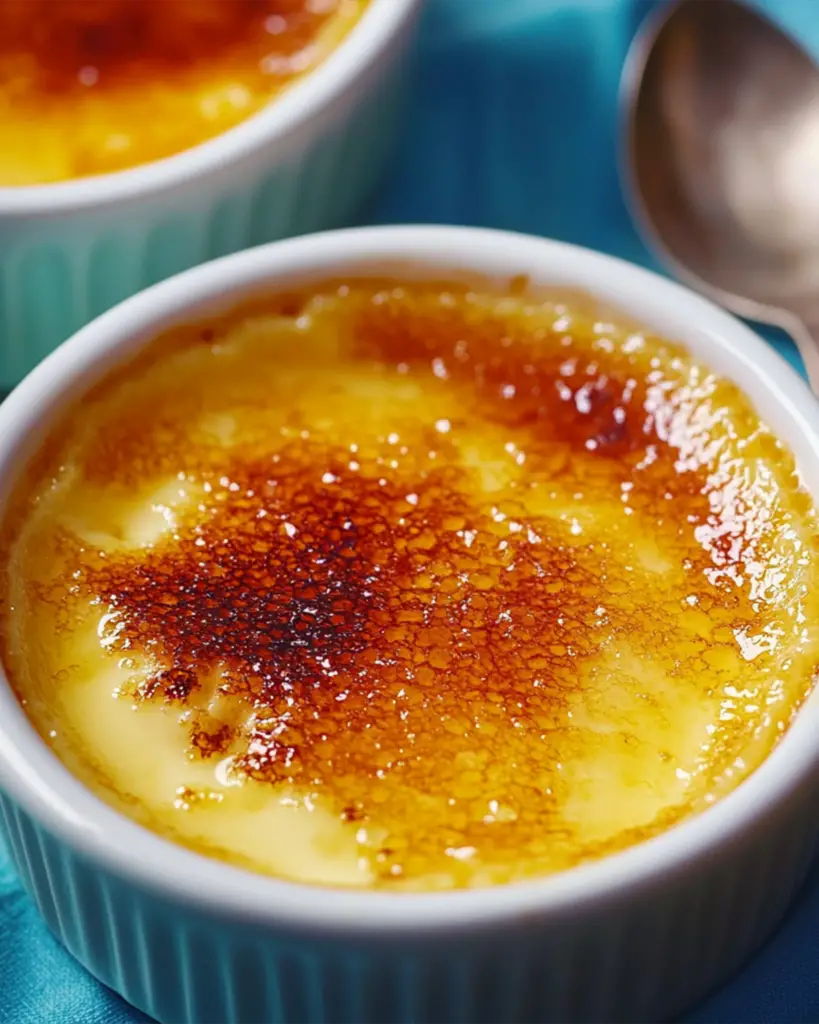There’s something undeniably luxurious about Crème Brûlée—that delicate, silky custard topped with a perfectly crisp, caramelized sugar crust. The moment your spoon cracks through the golden layer, revealing the creamy vanilla-infused custard beneath, you know you’re in for a treat.
Disclosure: This post contains affiliate links.If you click and make a purchase, I may earn a small commission at no extra cost to you.
Despite its fancy reputation, Crème Brûlée is surprisingly easy to make at home—and trust me, once you try it, you’ll never need to order it at a restaurant again!
Why You’ll Love This Crème Brûlée
Elegant Yet Simple
A show-stopping dessert with minimal ingredients and easy steps.
Rich & Creamy
A luscious, smooth custard that melts in your mouth.
That Signature Crunch
The caramelized sugar topping adds the perfect contrast in texture.
Perfect for Any Occasion
A romantic dinner, a dinner party, or just a treat for yourself!
Make-Ahead Friendly
Prepare in advance and caramelize the sugar just before serving.

Ingredients in Crème Brûlée
For the Custard
Heavy Cream: The base of a rich and creamy custard.
Egg Yolks: Create that silky, luxurious texture.
Granulated Sugar: Sweetens the custard and the brûlée topping.
Vanilla Bean or Extract: Infuses warmth and depth of flavor.
Salt: A pinch enhances the sweetness and balance.
For the Caramelized Topping
Granulated Sugar: Forms the crispy, caramelized crust.
Torch or Broiler: Essential for that classic crackly top.
(Note: The full ingredients list, including measurements, is provided in the recipe card directly below.)
Instructions
Prepare the Custard
Preheat your oven to 325°F (163°C). In a saucepan, heat the heavy cream over medium heat until it just begins to steam—do not let it boil.
Whisk the Egg Mixture
In a separate bowl, whisk the egg yolks, sugar, and vanilla until pale and slightly thickened.
Temper the Eggs
Slowly pour the warm cream into the egg mixture while whisking constantly. This prevents the eggs from scrambling.
Strain & Pour
Strain the mixture through a fine-mesh sieve to ensure a silky-smooth texture. Divide the custard into ramekins and place them in a baking dish.
Bake in a Water Bath
Pour hot water into the baking dish, filling it halfway up the sides of the ramekins. Bake for 30-35 minutes until the custard is set but still slightly wobbly in the center.
Cool & Chill
Remove from the oven and let the custards cool to room temperature, then refrigerate for at least 4 hours (or overnight).
Caramelize the Sugar
Before serving, sprinkle granulated sugar evenly over each custard. Use a kitchen torch to caramelize the sugar until deep golden brown. If using a broiler, place ramekins under high heat for 1-2 minutes—watch closely to prevent burning.
Serve & Enjoy
Let the sugar crust set for a minute, then crack through with a spoon and enjoy!
How to Serve Crème Brûlée
Classic Style
Serve as is—the contrast of creamy custard and crisp sugar is perfection.
With Fresh Berries
Top with raspberries, strawberries, or blueberries for a fresh, fruity balance.
Garnished with Whipped Cream
A light dollop of whipped cream adds extra indulgence.
Infused Variations
Try adding espresso, citrus zest, or a splash of liqueur for a fun twist.
Additional Tips
Use High-Quality Vanilla
A real vanilla bean or high-quality extract makes all the difference.
Avoid Overbaking
The custard should be set but slightly jiggly in the center when done.
Chill Completely
Give it at least 4 hours in the fridge to fully set.
Torch for Best Results
A kitchen torch gives the most even caramelization, but a broiler works in a pinch.
Make-Ahead Friendly
Bake the custard a day ahead and brûlée the sugar just before serving.
FAQ Section
Q1: Can I use milk instead of heavy cream?
A1: Heavy cream is best for the creamy texture, but you can substitute half-and-half if needed.
Q2: What’s the best sugar for caramelizing?
A2: Regular granulated sugar works best for an even caramelized topping.
Q3: Do I need a kitchen torch?
A3: It’s highly recommended, but you can use your oven broiler in a pinch.
Q4: Why is my custard too runny?
A4: It may be underbaked—make sure it’s set with a slight jiggle before chilling.
Q5: Can I make Crème Brûlée ahead of time?
A5: Yes! Bake and refrigerate the custard, then brûlée the sugar just before serving.
Q6: What’s the best way to store leftovers?
A6: Store covered in the fridge for up to 3 days, but don’t brûlée the sugar until serving.
Q7: Can I freeze Crème Brûlée?
A7: Freezing is not recommended as it affects the custard’s texture.
Q8: Why did my custard curdle?
A8: The cream was likely too hot when added to the eggs—temper it slowly to avoid cooking the yolks.
Q9: Can I make a dairy-free version?
A9: Yes! Use full-fat coconut milk instead of heavy cream for a dairy-free alternative.
Q10: What can I use instead of vanilla?
A10: Try almond extract, coffee, or citrus zest for a unique twist.
Final Thoughts
Making Crème Brûlée at home is easier than you think, and the results are absolutely restaurant-worthy. Whether you’re treating yourself or impressing guests, this elegant dessert is always a winner.




